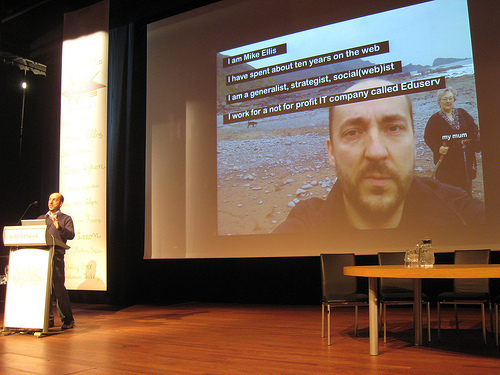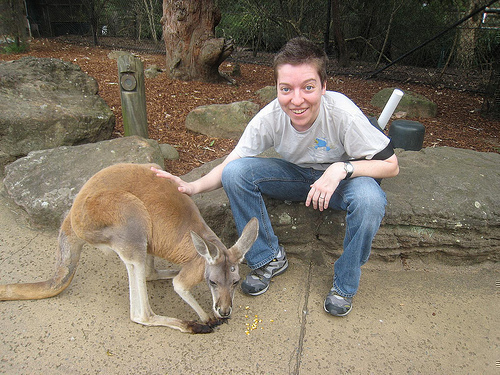Brooklyn Museum Collection API
We are at the sixth month marker of our Collection going online and you may have noticed that we keep adding to the features as we go along. In the first month, we released our tagging game “Tag! You’re It.” In month two, our exhibitions database was redesigned and republished into the Collections area. In month five, we added records from our Library and Archives. As we stand at the six month marker, we are excited to tell you about the release of the Brooklyn Museum Collection API.
What is an API? Well…you can look at Wikipedia for a super-techy explanation of this, but for those of you who are not geeks a short translation: it’s basically a way outside programmers can query our Collections data and create their own applications using it.

Mike Ellis presenting in Amsterdam…this guy can really convince you if you give him a chance.
So, how did we get here? Recently, I was presenting at a conference in Amsterdam along with Nina Simon and Mike Ellis. Mike’s highly entertaining presentation was about encouraging the public sector to consider releasing their data so that the community of developers worldwide could take advantage and create wonderful things with it. In Mike’s own words “if you love something, set it free” and that idea was something that resonated with me. Mike is a practical guy and he talked a lot about the stresses of staffing at cultural organizations, that we can’t possibly do it all ourselves and he wanted to spread the news of the potential in allowing outside developers the chance to add their own talent and wealth to our data.
This presentation of Mike’s stayed with me as we’ve watched many developers in the Flickr community work with the materials at the Flickr Commons. Flickr’s API is very flexible and several very talented programmers are taking advantage of the materials at The Commons and doing interesting things with them. It’s been inspiring to watch and given that we are an institution with a community-minded mission, we recogonize that developers are a significant part of community on the web and one we’d like to work with moving forward.
So, you may be wondering what kinds of applications could benefit from our data. There’s a wonderful X factor to all this—that we just don’t know what interesting something that someone will come up with—so it is exciting to wait and see. One thing we do know is people within our own industry have been working to create various pan-institution collection databases. By releasing our API, Brooklyn Museum data can now be included in these endeavors without requiring more staff time from us (something that would have been impossible prior to the API). The API offers us a way to share our data in a very democratic way—the work we do on the API can benefit all developers working with our collection online—not just major projects coming out of the non-profit sector. Frankie Roberto: next time you are building something in your garage, please remember to get your Brooklyn Museum API Key and include us in the fun.
It should be said, that in looking for examples to guide us in the non-profit world, we didn’t find many, but there was one shining beacon of light coming from New Zealand. The National Library of New Zealand released an API recently (fabulous interview here) and we carefully looked at what they were doing, how they structured the Terms of Use. This was a terrific example to follow and we couldn’t have been happier to have it to consider as we moved forward with our own.

Tourist with ‘roo at the Taronga Zoo in Sydney!
Now, there’s a little bit of irony in all of this. Seb Chan at the Powerhouse Museum in Sydney has been asking me for three years to provide Brooklyn Museum data, so it could be integrated into D*Hub (awesome site run by the Powerhouse where designers can search many collections at once). For years I’ve been saying that getting the collection online was a higher priority—that we just couldn’t devote staff time to providing a data set for a specific project like this one. I think after three years, Seb got so darn tired of us putting him off that he just stopped asking, but as I write this, I’m in Australia and New Zealand for speaking engagements in both countries. Seb, I’m here to tell you come get that API key so we can finally do this and Courtney, I’ll be coming to thank you and your awesome forward-thinking team in person.

Shelley Bernstein is the former Vice Director of Digital Engagement & Technology at the Brooklyn Museum where she spearheaded digital projects with public participation at their center. In the most recent example—ASK Brooklyn Museum—visitors ask questions using their mobile devices and experts answer in real time. She organized three award-winning projects—Click! A Crowd-Curated Exhibition, Split Second: Indian Paintings, GO: a community-curated open studio project—which enabled the public to participate in the exhibition process.
Shelley was named one of the 40 Under 40 in Crain's New York Business and her work on the Museum's digital strategy has been featured in the New York Times.
In 2016, Shelley joined the staff at the Barnes Foundation as the Deputy Director of Digital Initiatives and Chief Experience Officer.
